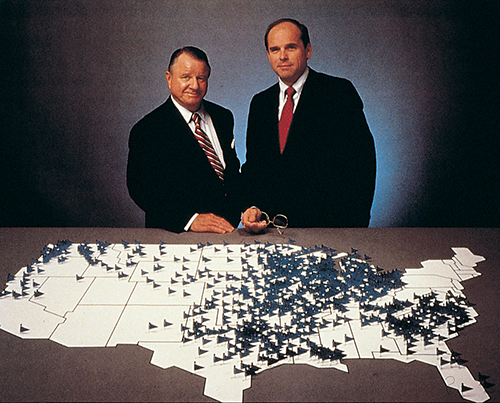
Robert Farwell, CFP®, RICP® Financial Advisor
6050 Santo Road, Suite 140, San Diego, CA 92124
858-514-8876 Fax: 800-489-0738
Emai: r.farwell@edwardjones.com

6050 Santo Road, Suite 140, San Diego, CA 92124
858-514-8876 Fax: 800-489-0738
Emai: r.farwell@edwardjones.com

When it comes to your financial future, it's important to work with someone who takes time to understand you and your situation. We take a step-by-step approach to identify your goals and develop specific strategies to help you achieve them. Contact me today and/to see how personal service can make a difference.
VISIT MY WEBSITE

content coming...
If you're retired, it's easy to let your finances go on autopilot. Since October is National Retirement Security Month, it's a good time to revisit some areas that can impact your long-term financial security and help your money last a lifetime.
Consider these suggestions:
• Manage your withdrawal rate. You'll likely need to tap into your retirement accounts — your IRA and 401(k) or similar employer-sponsored plan. But think carefully about how much income you withdraw every year. If you take out too much, especially in the early years of your retirement, you risk outliving your resources. You have the option of withdrawing from these accounts at age 59½. Once you turn 73, you'll be required to take out at least a certain amount each year based on your age and account balance.
• Estimate health care costs. When you turn 65, you will be eligible for Medicare, but you may still need a Medicare supplement plan, both of which will require premium payments. You'll probably also incur a variety of other unreimbursed expenses for doctor visit copays or deductibles, prescription drugs and vision, hearing and dental care. Additionally, about 70% of adults ages 65 and older will need some form of long-term support, according to the Department of Health and Human Services. This may include a paid home health aide (average cost of $77,792 per year), an assisted living residence (average cost of $70,500 per year) or nursing home care (private room average cost of $127,750 per year). (Cost estimates are from Genworth 2024 Cost of Care Survey.) Over the course of your retirement, these can add up, so be realistic when budgeting for health care expenses in retirement.
• Consider when to take Social Security. You can start receiving monthly Social Security checks at age 62, but your payments will generally be larger if you wait until your “full” retirement age of 66 or 67. (The size of your payments will “max out” at age 70.) If you believe you have longevity working in your favor, and you can afford to wait, you may well be better off by delaying Social Security as long as possible.
• Avoid investing too conservatively. Once you’re retired, you might think you should take as few chances with your investments as possible — after all, you have less time for them to bounce back from a downturn than you did during your working years. Nonetheless, it's important to consider keeping a reasonable percentage of growth-oriented investments in your portfolio to help you stay ahead of inflation. Even at a low rate, inflation can erode your purchasing power over time.
• Keep your generosity in check. If you have grown children who need financial help, or grandchildren heading to college someday, you’d no doubt like to do what you can to assist them. However, the hard truth is that they have more time than you to find workable financial solutions, whereas if you deplete your funds through your generosity, you could put yourself in a precarious position. So, be as giving as you can afford — but try not to go beyond that. By preserving your financial independence, you’ll end up benefiting your family as well.
Retirement is ideally an enjoyable time in your life, especially if you feel financially stable. So, take time to check in periodically to keep that stability on track.
This content was provided by Edward Jones for use by Robert Farwell, CFP®, RICP®, your local Edward Jones financial advisor at 858-514-8876, 6050 Santo Rd, Suite 140, San Diego, CA 92124.
Edward Jones, its employees and financial advisors cannot provide tax or legal advice. You should consult your attorney or qualified tax advisor regarding your situation.

In life, balance is everything — whether it's finding time between work and family or maintaining a healthy diet. The same goes for your investments. Keeping your financial portfolio balanced is a smart way to stay on track toward your long-term goals, even as the markets shift.
That's where portfolio rebalancing comes in. Rebalancing is the process of adjusting your investments — like stocks, bonds and cash — so they stay in the right mix for your needs. This mix, known as your asset allocation, is designed to reflect your comfort with risk, your investment goals and how long you have until you'll need to use the money for a major life event like retirement or the purchase of a new home.
For example, let's say your target portfolio is made up of 60% stocks, 30% bonds and 10% cash. Over time, as the value of each investment changes, your portfolio may become unbalanced. If stocks have a great year and rise in value, they could end up making up 70% of your portfolio. That means you're taking on more risk than you originally intended.
To get back to your 60/30/10 target, you would sell some stocks and possibly buy more bonds or cash investments. This helps bring your portfolio back in line with your goals.
Markets go up and down. That's normal — but it also means your portfolio can shift without your even touching it. If you don't rebalance regularly, you might be taking on too much (or too little) risk.
Rebalancing offers several benefits. It helps keep your investment plan on track and manages your exposure to risk. It also encourages disciplined decision-making, rather than chasing trends.
It might feel strange to sell investments that have been doing well and buy ones that haven't. But this strategy can help you "buy low and sell high," which is one of the key ideas behind successful investing.
You may be wondering how often you should rebalance your portfolio. There really is no one-size-fits-all answer. Some people rebalance once a year. Others do it more frequently based on how far their investments drift from their target percentages.
What's important is that you check your portfolio regularly — at least annually — and adjust when needed. After big market movements, whether up or down, it's a good idea to take a closer look.
Keep in mind that if you rebalance by selling investments in a taxable account, you might owe capital gains taxes. Also, some brokers charge fees for trades. But if you own similar investments in a retirement account like an IRA or 401(k), you can often rebalance without triggering taxes. A financial advisor can help you choose the best approach — and may even be able to help you avoid or reduce costs.
Your ideal investment mix will probably change as your life changes. Younger investors might favor stocks for growth. As you near retirement, you may want to focus more on income and stability. Rebalancing helps you adjust as your goals evolve.
Think of your portfolio like a car on a road trip — regular check-ins and small course corrections will help you stay on the right path. A financial advisor can help you design a strategy that keeps your investments aligned with your goals every step of the way.
This article was written by Edward Jones for use by your local Edward Jones Financial Advisor, Robert Farwell, CFP®, RICP®, at 858-514-8876. Edward Jones, Member SIPC
Edward Jones, its employees, and financial advisors cannot provide tax or legal advice. You should consult your attorney or qualified tax advisor regarding your situation.